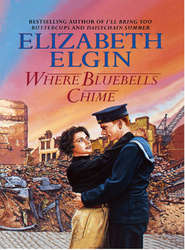По всем вопросам обращайтесь на: info@litportal.ru
(©) 2003-2024.
✖
Windflower Wedding
Автор
Год написания книги
2018
Настройки чтения
Размер шрифта
Высота строк
Поля
‘I see. Tell me,’ Keth whispered, ‘how old you are.’
‘I am sixteen – and a little bit – and I am an unimportant part of – of this, you understand?’
Keth nodded.
‘I carry messages, Hibou. Because I look so young, the soldiers do not suspect me.’
‘But how will your aunt explain me away?’
‘Don’t worry. She has already made it known she is expecting a man to dig her garden. And do I speak too quickly for you, Hibou? Do you understand what I say?’
‘Yes – but it would help if you could speak just a little more slowly.’
‘I will try to remember. And we will speak English, you and I – when it is safe, that is.’
‘Do your parents know what you are doing tonight?’
‘My parents,’ she whispered, ‘are Jewish. That is why I live here with Tante Clara. She is not my aunt and she is not Jewish. When the Germans invaded France, I was sent here from Paris, where we lived, to my mother’s old friend. But for a year now there has been no word from Paris and we think my parents have been – taken.’
‘They’re in prison? And don’t you worry too that you might be arrested?’
‘Not prison. I think they are dead. And I don’t worry too much. I am dark, but I was not born Jewish. I am an adopted child and my nose is small and tilted. It would pass the test.’
‘Test? What is that?’
‘You do not know? People suspected of being Jewish have their noses measured. The Germans have a special instrument for doing it. It’s true! And may God bless the woman who gave me my nose!’
‘So Jews really are treated badly by the Nazis?’
‘Not badly, Hibou; like dirt. I feel I shall never see my parents again. It is why I do all I can to help.’
‘But you are too young to get involved, Natasha.’
If my nose had been a different shape, I would not be too young to be gassed, and my body burned. Ssssh!’ she hissed as heavy footsteps trod the path; footsteps which paused briefly, then went on.
They stood still, breath indrawn, then heard the low muttering of an old voice, speaking to the dogs.
‘It is all right. It is Madame,’ Natasha whispered. ‘She wears boots …’
The footsteps returned and stopped again. ‘Are you there, child?’ The women peered into the darkness.
‘Yes. And he’s here.’ Natasha stepped out of the shadows.
‘Come inside.’ The woman clumped down the path. ‘You are late, Monsieur. I expected you days ago.’
‘I am sorry, Madame Piccard. I had to wait for my papers.’
‘But you’ve got them? They’re in order?’ she demanded sharply.
‘All in order.’ Keth reached in his inside pocket but she held up her hand.
‘No matter. I know who you are, M’sieur Martin.’
‘Perhaps if you could speak more slowly, Tante …’ Natasha hesitated.
‘Of course. He is hard of hearing. I forgot.’ She shaped her mouth round her words as if she really believed Gaston Martin’s deafness, then walked to the hearth, lifting a pan from the hob, stirring it slowly. ‘There is soup, M’sieur, and bread. You will eat?’
‘If you can spare it, please.’ All at once the tension of the past days left him. Here, in this low-ceilinged, lamp-lit kitchen, Keth felt almost safe.
‘What we have, we share. You are welcome.’
‘I have ration cards and, Madame, am I to be told where I am?’
‘You haven’t told him?’ she asked of Natasha.
‘No.’
‘And They did not tell you?’
‘No, Madame. Just that I would be met and brought to a safe house.’
‘Then you are in Clissy. It is as well you know, since you came here by train!’
‘Of course!’ He smiled across the table and Natasha smiled in return with the mischief of Kitty’s smile, he thought in amazement. Kitty, in the summer of ’thirty-seven, with long, black, bobbing curls; hair as black as his own.
He glanced down at his bowl as Madame Piccard and Natasha murmured a grace, then blessed themselves before picking up their spoons. And because he was now Gaston Martin, Keth imitated their actions.
Gaston Martin, he insisted silently. He must tell himself again and again that Keth Purvis was a long way away in Washington. And while he was here in Clissy, he must not allow himself to think of Daisy, because Gaston Martin would not think of her.
He did not even know she existed.
11 (#ulink_073e8f8a-afa3-562b-b098-46fecb525284)
‘So, Anna, they still hold out at Tsaritsyn.’ Olga Petrovska turned off the wireless. ‘The Bolsheviks are putting up something of a fight – at last!’
‘Something! Mama, the Luftwaffe bombed the city almost to the ground. They left little standing, yet the Russians are fighting for every ruin, every cellar; even for heaps of rubble! And when they have no guns, they fight with pickaxes and petrol bombs – women, too!’
‘Ah, yes.’ The Countess picked up her embroidery frame. ‘I read in Picture Post that Nazi soldiers are becoming afraid of the Russians. They are calling them men possessed – devils. Hitler has lost a quarter of a million men. Those Bolsheviks in Tsaritsyn have one ambition, it seems; to kill at least one Nazi each day, every day.’ She jabbed her needle viciously.
‘That is gruesome and horrible! Not all those soldiers are Nazis. Many are decent boys like Drew and Bas! And you must not call it Tsaritsyn. It is Stalingrad. It has been Stalingrad for nearly twenty years.’
‘Indeed? So those soldiers who try to take Tsaritsyn are changing their tune now. They were all fervent Nazis when the war was going well for them and no country stood up to them!’
‘And you, Mama, had not one good word to say for the Communists, yet now you side with them!’
‘I do, Anna, because they are defending Mother Russia. And if they rid it of those arrogant Huns, I will accept they have earned their right to my country.’
‘Even though you will never see our home again – nor Peterhof?’











